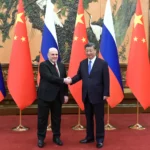
Geopolitics
The US must grasp the opportunity to stabilise relations with China
As high-level interactions increase, both sides must aim for pragmatic reconnection
EVAN MEDEIROS: The writer is a professor at Georgetown University and served on the US National Security Council staff from 2009-2015
A new phase in US-China strategic competition may be opening up. After months of acrimony and stasis, contact between the two countries is finally resuming. The challenge for Washington and Beijing is to capitalise on this moment to produce an enduring basis for stable relations.
The future of global stability and prosperity depends on it. This week, China’s new US ambassador arrived after a long vacancy. China’s commerce minister also travelled to Washington, the first senior official to visit since 2020. Most importantly, this month US national security adviser Jake Sullivan met China’s top diplomat, Wang Yi, jump-starting dialogue frozen since the spring. This may become the most important bilateral channel for discussions. More high-level interactions are coming. Several US cabinet officials are likely to travel to Beijing, probably culminating in a visit by Xi Jinping to San Francisco for the 31st Asia-Pacific Economic Cooperation leaders’ summit.
All this has created a window of opportunity to put the relationship on a more stable trajectory, or at least one less prone to accident, miscalculation or crisis. The opening is small and fragile but, done well, it could produce a relationship that is more predictable, resilient and productive. Both sides are signalling they want more stability — or at least less volatility and friction. But each wants this for different reasons, and it remains uncertain whether these views can be reconciled. Washington wants dialogue and risk reduction, amid further policies of competition and pushback.
By contrast, China wants to reduce the constant strategic pressure it faces from the US and its allies, while continuing to bend global rules and norms in its favour. The next few months will be a process of finding — or not finding — a new normal, a strategic equilibrium of sorts.
It comes at a critical time. This is Biden’s last chance before 2024 election dynamics consume Washington. The US and its allies are in the opening stages of a new type of strategic competition, one with little precedent in modern international affairs. This is geopolitical terra incognita for everyone.
So, how should policymakers best use the opportunity? First, US leaders and their counterparts in Europe and Asia need to proceed with a clear understanding of the moment.
Xi’s China is capable, ambitious and confident but also frustrated and insecure. Xi now believes China is locked in a long-term geopolitical and ideological competition with the “global west”, which he sees as a prime threat to domestic and external security. His views are hardening, reflected in his rare public statement in March that “western countries led by the US have implemented all-round containment, encirclement and suppression against us”.
Thus, Washington and Beijing are constantly testing each other’s boundaries, as their competition militarises, globalises and nuclear weapons move to the fore. Xi’s tolerance for risk and friction is growing. And the relationship possesses few of the mechanisms to manage such complexity. This new phase is not detente, far from it. Rather, it is reconnection. Both sides need to rebuild basic channels of communication.
Washington and its partners need to work out how to talk to Xi’s new cohort of technocrats, securocrats and ideologues. This is fraught with risks. As dialogue resumes, a focus on improving the relationship could become an end in itself — as opposed to the means to advance US interests.
This is a dynamic Beijing skilfully uses to play for time and advantage. Second, Washington needs to have a game plan for the entire set of interactions, culminating in Xi’s possible visit. Washington and Beijing should try to agree on an infrastructure for sustained dialogue, set a modest agenda focused on the most consequential issues, and attempt to solve some small problems. They could start with increasing direct flights and resolving exit bans; more substantial challenges include Chinese policies towards North Korea and Iran, and Beijing’s contributions to humanitarian relief in Ukraine.
Third, Washington needs to proceed with clear objectives. These should include reducing Chinese misperception of US intentions, clarifying US policy (especially about Taiwan), stabilising the most volatile types of competition and eliciting co-operation on common problems. The US then needs to measure success or failure, and adjust policy accordingly. Sustained conversations about Ukraine, North Korea, Iran, global macroeconomic and financial stability, especially emerging market debt, are long overdue. An American openness to a constructive Chinese role on all these issues is well worth exploring.
Fourth, both sides need to be pragmatic and have modest ambitions. Relitigating Nancy Pelosi’s visit to Taiwan and the balloon incident will just incite recriminations. The US-Soviet cold war is a tempting but inadequate reference point to understand the nature of US-China ties today. But even the cold war had its phases and moments of change, notably the Cuban missile crisis. For US-China relations, just such a moment may be at hand.
It would be a tragedy to squander it, lest we repeat such a dangerous past.
Copyright The Financial Times Limited 2023. All rights reserved.Reuse this content(opens in new window)CommentsJump to comments section Latest on Geopolitics FT MagazineSimon Kuper There are only two global superpowers left Special ReportBusiness Legal Leaders Wanted: in-house legal leaders who can interpret world events Martin Wolf The G7 must accept that it cannot run the world War in Ukraine Zelenskyy seeks to win over Brazil and India at G7 summit US politics & policy Hillary Clinton says Ukraine war has set back China’s plans for Taiwan News in-depthG7 Zelenskyy shapes ‘political battlefield’ by confronting developing powers G7 G7 prepares unified response to Chinese ‘economic coercion’ Follow the topics in this article Evan Medeiros Add to myFT Chinese politics & policy Add to myFT US-China trade dispute Add to myFT US-China relations Add to myFT Geopolitics Add to myFT Comments How easy or hard was it to use FT.com today? feedback Useful links Support Legal & Privacy Services Tools Community & Events More from the FT Group Markets data delayed by at least 15 minutes. © THE FINANCIAL TIMES LTD 2023. FT and ‘Financial Times’ are trademarks of The Financial Times Ltd. The Financial Times and its journalism are subject to a self-regulation regime under the FT Editorial Code of Practice.

